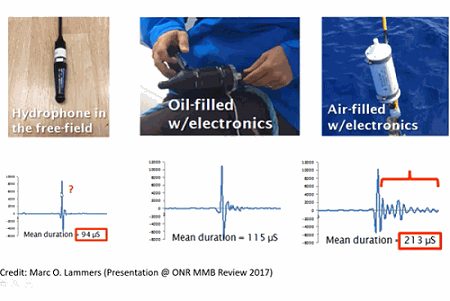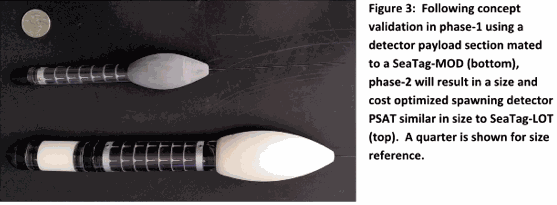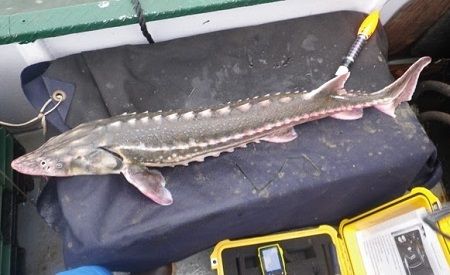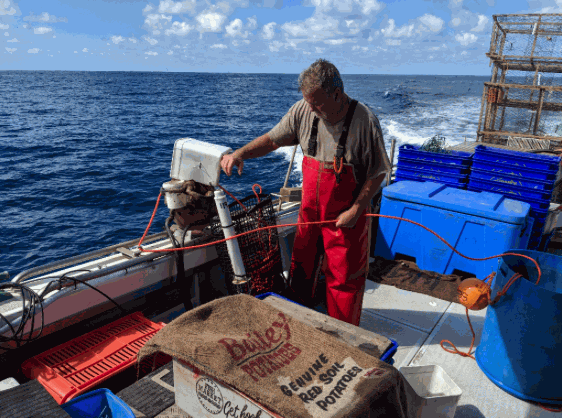Primary Monthly Newsletters

Low-cost & User Friendly Environmental Monitoring
Find the best location to build a hydrokinetic energy harvesting site for renewable energy. Utilize real-time acoustic data streaming and batch processing for automated data reduction. Find out the important answers to important questions regarding environmental impact of MHK chosen sites.
Learn more about sonarpoint localizing toolkitNew Studies ?
-
Satellite Tags For Detection & Reporting of Fish Spawning Events
-
California Approves Ropeless Fishing - To Begin In 2021
-
Desert Star Systems In The News

Tools for Conservation Management
Consumer guides for ethically caught and sustainable seafood are more widely available now than ever before. More restaurants and grocery stores are proudly displaying these labels and facts for consumer consumption. Could Whale-Safe Seafood labels be next?
Read The Autumn Newsletter update here

Update - SonarPoint Hydrophone Selection
This month we answer common questions about PAM capabilities including hydrophone selection, simultaneous frequency monitoring, self noise and frequency response curves. Which hydrophone is best suited for your projects? Find out the pros and cons here.
Read the september 2020 newsletter hereNext Steps For Underwater Acoustics... and beyond traditional studies.
With the launch of Desert Star's newest underwater recorders known as SonarPoint™, we also take a look at what lies in store for underwater acoustics such as SeaTag PSAT fish spawning detection and the future of ropeless fishing.
Read More about the latest acoustic innovations here

Introducing The Acoustic Release Cartridge For Cold Environments
In this month's newsletter we take a look at the Quality Control Team testing with the SAM-1™ Acoustic Modem, introducing the ARC cartridge replacement system (including a Video Tutorial) and more of Desert Star Systems in the news!
SeaTag™ Paper Review: Physical Recovery Of Re-usable PSATs
Satellite tags leap forward into the era of Artificial Intelligence! SeaTag-MOD PSATs were used to train an algorithm to differentiate living from dead Green Sturgeons in the San Francisco Bay area. This was made possible by the physical recovery of tags for a frequency analysis with complete datasets.
Read The Paper Review.jpg)

Affordability Of High Capability Wildlife Studies
Cost is often the largest hindrance to satellite tagging studies. How can a relevant sample size be obtained in order to produce a statistically meaningful study? In a world of competitive science and frequently constrained budgets the solution is not only technological innovation but also economic innovation. Learn more about the economic innovation offered by SeaTags™ and SonarPoint™ Hydrophone Recorders.
Acoustic Arrays For Sound Source Localization
Sound source arrays work by obtaining a precisely time-synchronized acoustic recording from three or more hydrophone locations. By using the difference in which the sound is received by each recording location it is possible to accurately determine where a sound source originated along with directional heading and speed.
Satellite Tags For The Dynamic Management Of Sea Turtles
In the management of sea turtles and other at risk species we are suffering from a sparsity of sensors. This leaves our wildlife and fisheries managers often guessing to make decisions that effectively mitigate risk to animals while limiting impact on fishing, shipping and other activities at sea.
Argos satellite tags can be a powerful tool to inform decision making.
The Economics of Ropeless Fishing
Presented By Marco Flagg
Department of Fisheries and Oceans Canada
Gear Innovation Summit 2020
Halifax, Nova Scotia
February 11-12
Ropeless Fishing Highlighted at DFO Summit
Ropeless fishing technology presented at the DFO Gear Innovation Summit explores the economic viability of ropeless gear. Read how fishers in New South Wales have increased their profitability using Desert Star's ropeless gear commercially since 2012.
SonarPoint Underwater Passive Acoustic Recorder & Localizing Toolkit

California Requires Ropeless Fishing
The preservation of our world’s oceans, and especially conservation of animals like majestic whales is a higher priority than keeping slightly lower cost crab or lobster on the table for a few more years. READ MORE
New Spawning Detector Tag
In order to best explain the Spawning Detector Tag, I'll break down each topic into questions you should probably be asking. So here we go!


The Little SeaTag that Could
The Bay of Fundy 2013; Bryan Morse, a researcher at the University of New Brunswick attached a
Preventing Whale Entanglements; Pilots in Progress
READ MORE


Expanding the Freshwater Researchers Toolkit
It's Time to Get Serious About Preventing Whale Entanglements
It's time to get serious about preventing whale entanglements. In conjunction with continuing support and new innovations in our SeaTag line, Desert Star is also emphasizing the importance of preventing marine mammal entanglements with our ARC-1XD and future ARC-2. Record numbers of cetacean species were entangled last year


Charting New Waters in Ocean Technology
Among PSAT,
SeaTags


Tracking Halibut & Monkfish w/Pop-up Satellite Tags -
This months newsletter highlights one of Sea-Tags unique capabilities; tracking demersal commercial species. Tracking fish in the absence of light is considerably more difficult, requires a significant amount of time to develop the appropriate methods, and is quite novel...
